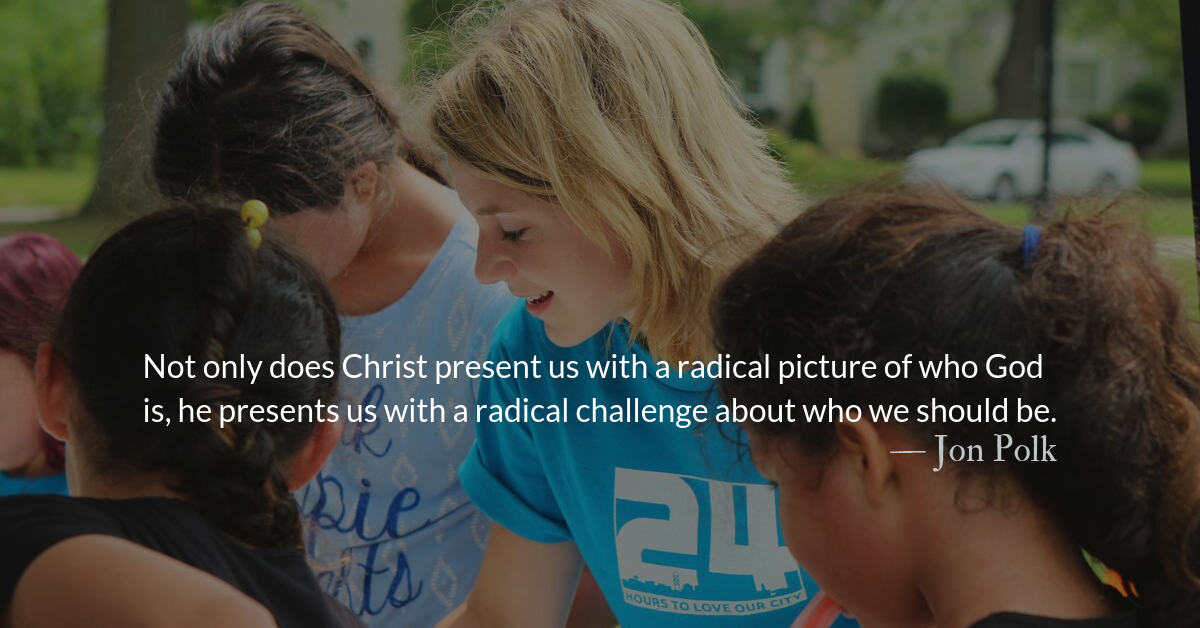Scripture Focus: Philippians 2:5-8
In your relationships with one another, have the same mindset as Christ Jesus:
Who, being in very nature God,
did not consider equality with God something to be used to his own advantage;
rather, he made himself nothing
by taking the very nature of a servant,
being made in human likeness.
And being found in appearance as a man,
he humbled himself
by becoming obedient to death—
even death on a cross!
Reflection: Born to Serve
By Jon Polk
In what is traditionally known as the “Christ Hymn” in Philippians 2, Paul describes who Christ is, and by extension, who God is, and furthermore by example, who we should be.
Who is Christ? Christ was in his very nature God. He was God himself, even though he was uniquely human, too.
However, Christ didn’t behave the way people expected gods to behave. In the first century, they were more familiar with the volatile, angry gods of the Greek pantheon, who used power to advance themselves or to subdue others.
Gods didn’t live their lives in humility. Gods didn’t come among their people as servants. And gods especially didn’t sacrifice their lives for the sake of their subjects.
Paul writes that Christ took the very nature of a servant. He uses the Greek word doulos, which is more properly translated “slave.” A slave existed in servitude to others without advantages, rights or privileges.
Christ became nothing. He emptied himself by pouring out his grace to others. He humbled himself by entering into relationship with lowly humans. He obeyed death, freely giving his life.
Who is God? God’s strength is not in his ability to manipulate or subdue his subjects, but in his willingness to take on the form of his subjects. Not only does God condescend to human form, he chose not to come as a ruler or king but a servant.
Jürgen Moltmann writes in The Crucified God, “God is not greater than he is in this humiliation. God is not more glorious than he is in this self-surrender. God is not more powerful than he is in this helplessness. God is not more divine than he is in this humanity.”
Who should we be? Paul states we should “have the same mindset as Christ Jesus.” Not only does Christ present us with a radical picture of who God is, he presents us with a radical challenge about who we should be: humble servants giving ourselves on behalf of others.
Dietrich Bonhoeffer writes “The church is the church only when it exists for others… It must not underestimate the importance of human example which has its origin in the humanity of Jesus.”
Jesus Christ is our ultimate example. For certain, none of us could ever be sinless and perfect, but that’s not the example that Paul wants us to see. Jesus is the full representation of God, but he also represents what it means to be fully human: to live life completely in service of others.
Divine Hours Prayer: The Refrain for the Morning Lessons
From this day forward all generations will call me blessed, for the Almighty has done great things for me. — Luke 1.48
– From The Divine Hours: Prayers for Autumn and Wintertime by Phyllis Tickle.
1 Kings 11 (Listen – 7:05)
Phillipians 2 (Listen – 3:45)
Thank You!
Thank you to our donors who support our readers by making it possible to continue The Park Forum devotionals. This year, The Park Forum audiences opened 200,000 free, and ad-free, devotional content. Follow this link to join our donors with a one-time or a monthly gift.
Read more about He Stoops to Raise
Christ’s entire life could be understood as a process of descending and ascending. He goes from the highest place, to the lowest place. And then, he ascends.
Read more about Sacrifice of Self
Ultimately we have been called to imitate our self-sacrificing savior, Jesus, by giving of ourselves to do good for the benefit of others.






